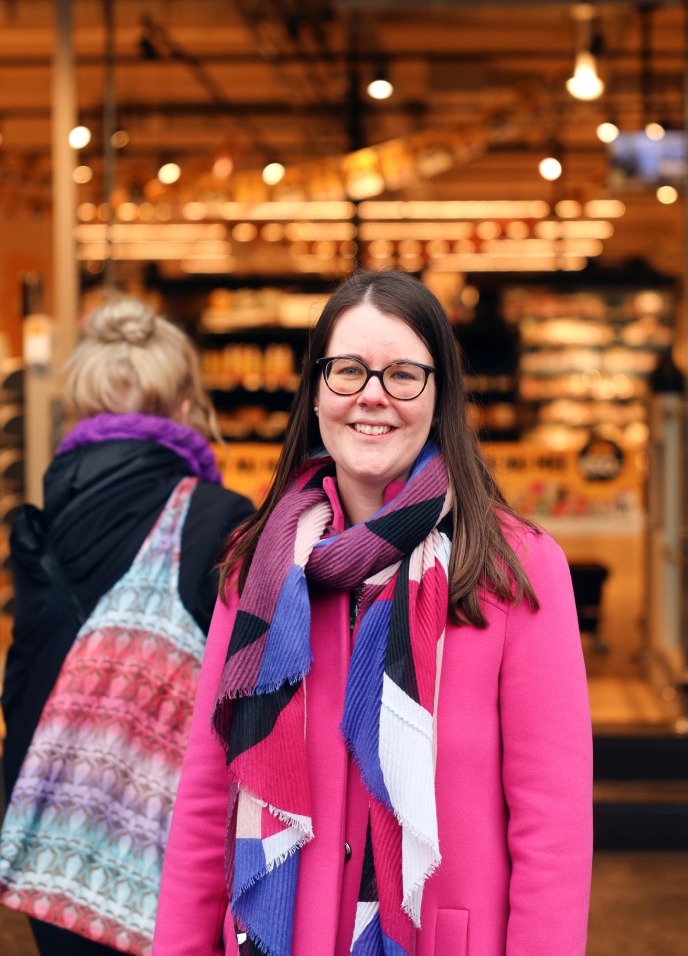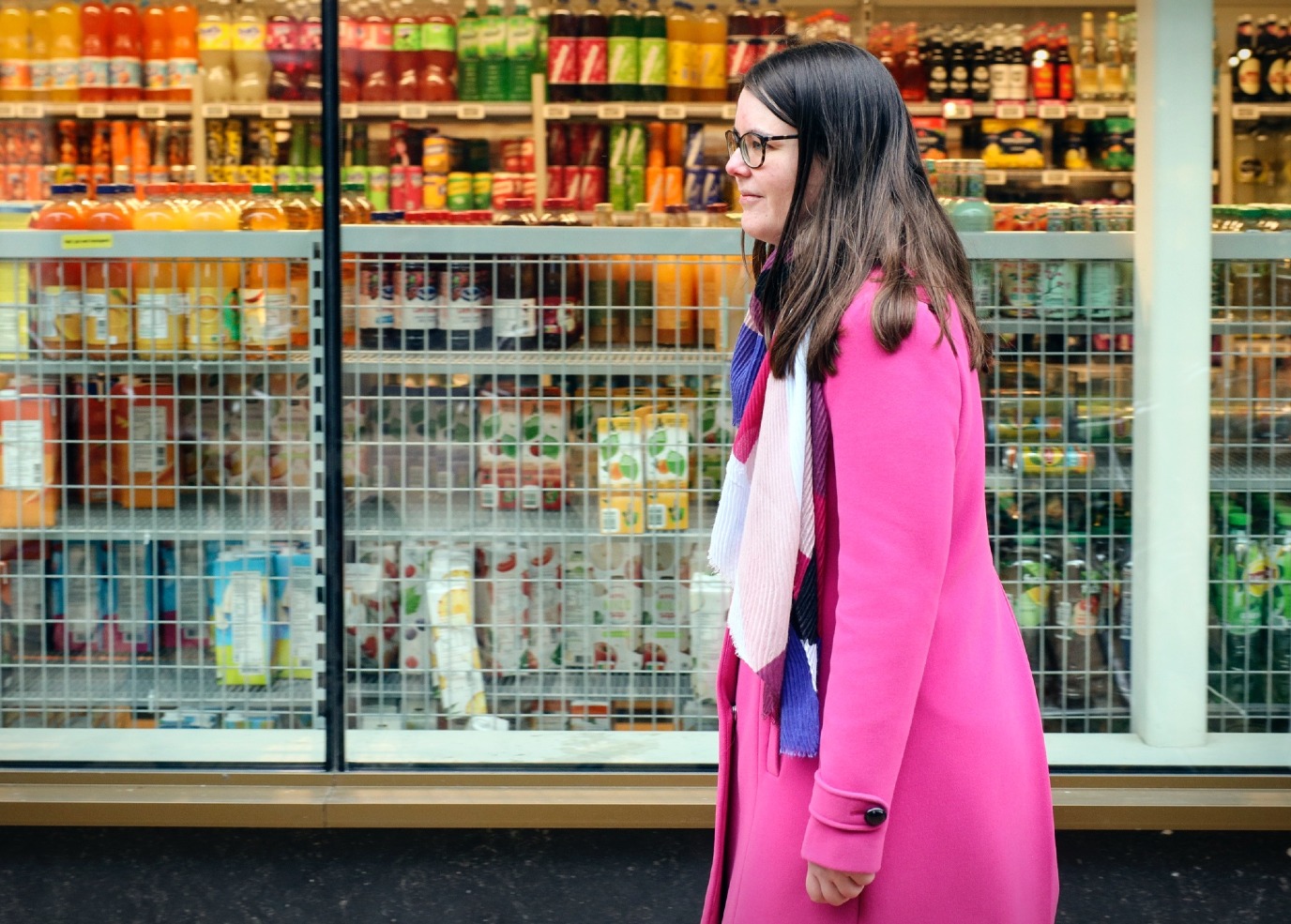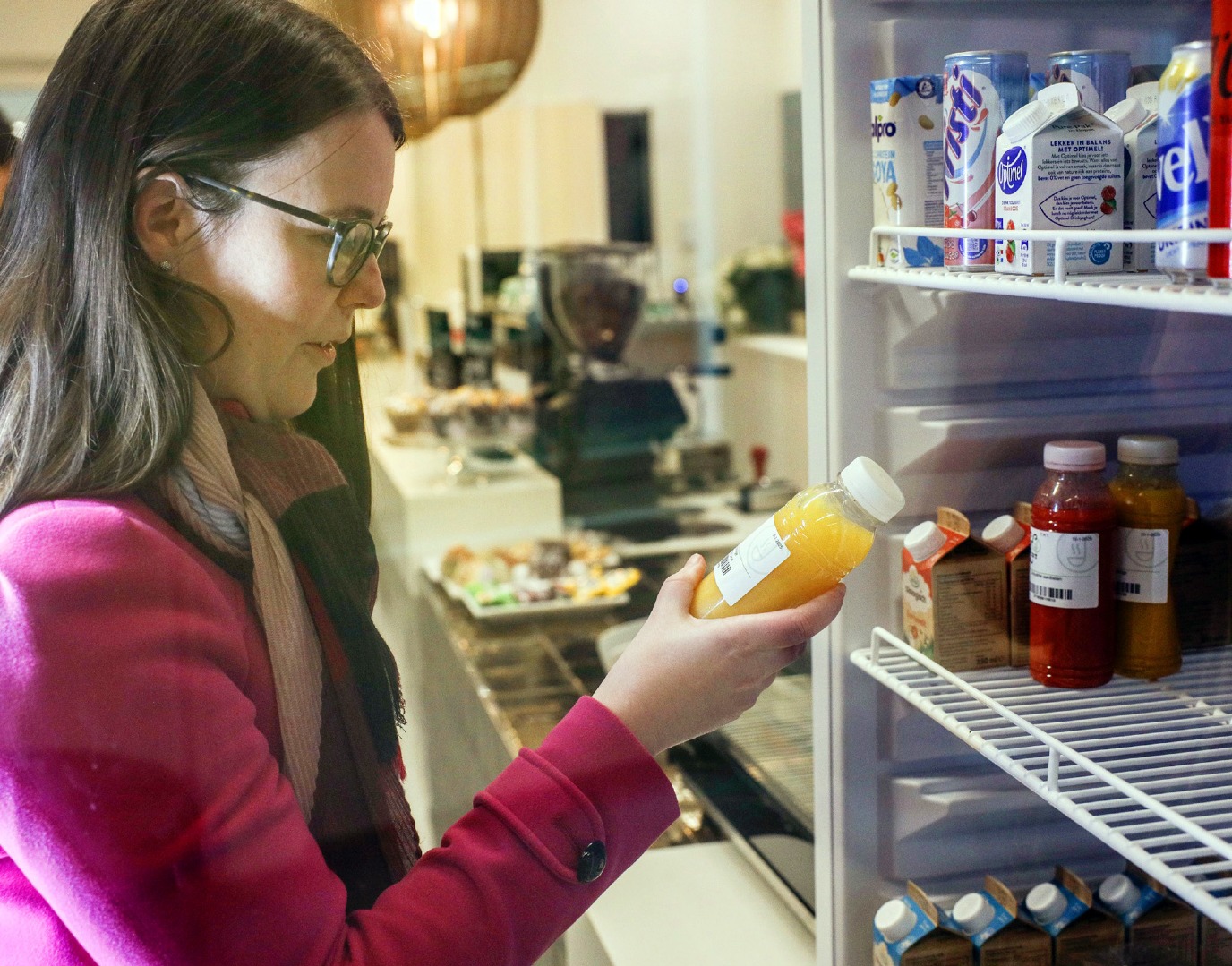'To entice is okay, to mislead is not'

In the supermarket, there is a carton of ‘blackcurrant juice’. At least, that is what it is called and what the picture on the packaging suggests. The list of ingredients, however, states that the contents are mainly made of apples and grapes. Is this allowed without question? Are customers not being misled in this way? Lawyer Carien de Jager is engaged with these kinds of questions. ‘I study the dividing line between enticement and deception.’
Text: Gert Gritter, Corporate Communicatie / Photos: Henk Veenstra
Crab salad
Under the European Food Information Regulation, labels of prepackaged foods must contain specific obligatory information, mainly concerning health and safety, including the nutrition declaration, the use-by date, the allergens and ingredients. It is also common to include voluntary information to attract and inform consumers. That is allowed as long as the provisions of the Food Information Regulation are complied with. Such voluntary elements are, for example, green claims and images that entice consumers to buy a product. However, the packaging must not be misleading. For this reason, certain misleading packaging has been corrected in the course of time, among other things as a result of decisions by the court, the Advertising Code Committee and activities of the Netherlands Food and Consumer Product Safety Authority. Crab salad containing surimi instead of ‘real’ crab meat is now called “surimi-crab salad”. Another example is “Optimel Vla Vanille” , vanilla custard that did not contain any real vanilla and was therefore considered misleading by the Advertising Code Committee. That product is now called “Vla Vanillesmaak” (vanilla-flavoured custard).
Marketing
‘European legislation explicitly prohibits misleading food packaging,’ says De Jager. ‘The court then proceeds on the basis of a “normally informed and reasonably prudent and attentive average consumer”. The assumption is that such a consumer will read the list of ingredients and, therefore, knows what the ingredients are. Other fantasy names, recommendations and images on the packaging may make a packaging misleading from a legal point of view, but the emphasis is on a correct list of ingredients. This should actually be the other way around,’ says De Jager. ‘Psychological research strongly suggests that, in a supermarket, consumers are mainly influenced by, for example, images and colours, and much less by text.’

Experiment
Many consumers do not, or hardly, allow themselves to be informed by reading the list of ingredients. This was also confirmed by an experiment carried out by De Jager in cooperation with health psychologist Prof. Dr. Arie Dijkstra, who also works at the UG. The research was made possible by a grant from the Gratama foundation. A group of 379 participants was asked to choose between different kinds of strawberry yoghurt, and to answer knowledge questions about them. What they did not know, was that the researchers were mainly interested in knowing whether they did or did not consult the list of ingredients. The results were revealing. 67.3% of the participants appeared not to look at the list of ingredients. In addition, many participants were unable to answer the five knowledge questions correctly: 54.1% did not answer any question correctly. The numbers may also be exaggerated by the chance of guessing right when answering multiple choice questions.
Psychology and law: a logical combination
For De Jager as a lawyer, it is nothing special to use insights from psychology and work together with colleagues from the behavioral sciences. ‘The purpose of law is often to influence human behaviour in some way or another, and psychology relates to human behaviour. A logical combination, therefore. For example, if you want to know why legislation is not effective and what you should do to change that, an interdisciplinary approach helps. What I like about law, is that legislation and jurisdiction can help to actually do something about specific societal problems and abuses. On the other hand, psychology provides insight into human behaviour, allowing us to gain insight into how well the law succeeds in doing that, why it does or doesn't, and possible improvements.’
Financial information leaflets
De Jager has increasingly understood how the fields of law and psychology can strengthen one another. For this reason, she combined her law studies and doctorate programme with a Master’s degree in Psychology. The value of this already became clear when she was working on her doctoral thesis in 2018. This was about financial information leaflets that are supposed to protect consumers in Europe from the risks of complex financial products, including life insurances with an investment component. Her conclusion was that those information leaflets often miss their aim because consumers make decisions in a way that an information document has little influence on. The lawyer-psychologist has recently received an NWO Open Competition XS grant, with two research components. She is going to analyse how courts in the Netherlands and in Germany judge misleading food packaging (legal research). In addition, she wants to conduct an experiment based on insights from the behaviourial-scientific literature to investigate whether those judgments are in line with what is really misleading for consumers (psychological-empirical research).

First impression
What kind of consumer is De Jager herself? Smiling: ‘I am certainly not the kind of person who turns around all cartons in a supermarket to examine the food labels. I really do not have time for that, especially when my son is with me. As a consumer, you use all kinds of strategies to make a quick choice, preferably at a single glance. It would, therefore, be good if the visual impression the packaging gives corresponds to the composition of the food.’ The psychologist in her also points out other factors. ‘Not everybody has the same need for information. Some people are just not that interested in healthy food. Our research suggests that this group tends to look even more at images and so forth than to factual information in the list of ingredients. The context plays a role, too. If the number of options for choosing a product is large, you will automatically base your choice on intuition and a first impression rather than on anything else.’
Unfair
What motivates De Jager as a researcher? ‘If enticement turns into deception, people are being cheated. If you want to eat healthily, or if you simply want to know what you eat, deception makes it very difficult for you to actually do that. Reading the list of ingredients of everything you eat, is after all almost impossible, let alone that you can understand everything that is written there. That is unfair, and I find that hard to take. I find it important that knowledge of marketing — the psychological insights into how consumers make decisions — is not only used by the marketing departments of the food industry. That knowledge is important for, among other things, the employer and the courts to ensure that consumers are not being misled, but are able to make informed, e.g. healthy and sustainable, choices. I am glad to be able to contribute to that with my research.’
